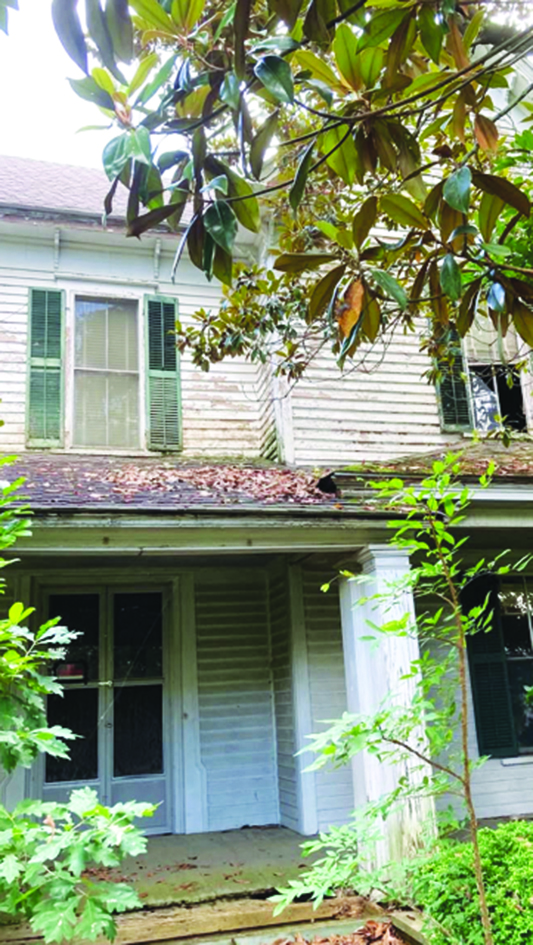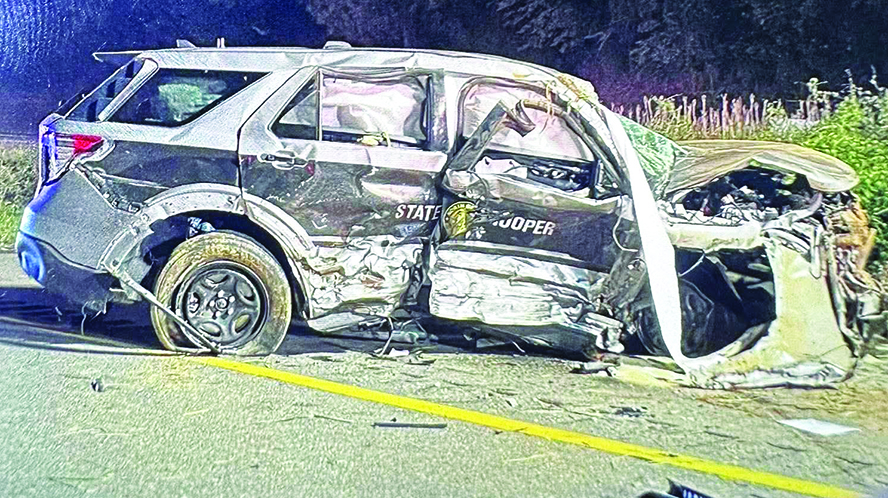The Literary Corner: Renegade Writer’s Guild
Published 9:25 am Thursday, September 27, 2018
“Puzzling Out Life on a Mission Trip”
By Julie Terry Cartner
Mission trips are not to be taken lightly. First, they are hard work. We get hot, tired, sweaty, and sore. Second, the living conditions are not what we are used to. On the nicer trips we have access to showers, beds and electricity, but they’re not our showers, beds or electricity. And finally, we are not in our comfort zone. We may or may not know all of the people working with us. We are of different ages, genders, beliefs and lifestyles. Plus, we are not living our regular lives or schedules and must adapt for each other. However, the good far outweighs the bad, and by the end of the week, we always realize that the concerns and differences which worried us before the trip are negligible compared to the feelings of success created by completing jobs and helping others.
Trending
On my most recent mission trip, I helped put a roof on a house. It was my second roofing experience, both of which, by the way, took place in eastern North Carolina in August! What is wrong with us? Do you know how hot it is on a roof in August in North Carolina? One team member’s shoe melted! That’s right, the sole of her shoe got so hot it melted! The first time we patched a large area. We started by removing the bad part, and as most home repairs go, the bad part was much larger than anticipated – large enough that the last day of our trip we were not going to be able to finish during the regular work day. Without any argument, we agreed to buy the extra shingles out of our budget and stay after hours to get the job done. And we did. That’s what we do – we finish jobs.
This time we were helping another group with the roof – and there was only one person in the other group who wasn’t afraid to get up on a roof, so they really needed us. Five of us from my group volunteered to help – one male, four females. Our diverse ages, though ranging from high school age, to college, to young adult, to a not-so-young adult, were irrelevant. What mattered was that we worked together to get the job completed.
There’s something about sitting on a roof, looking down relatively straight lines of shingles, knowing we were the ones to make it that way, which is so rewarding. We had quickly gotten a system going, one pair starting a line of shingles, then the other pair starting the line above, the fifth person handing up shingles, water bottles, refilled nail guns and other tools. When the first row was done, we moved to the third row and continued, each pair moving up a row until we reached the top. Finally the ridge cap – cutting the shingles to the right size, then overlapping both sides of the roof all the way down the top. Goal achieved, a leak-less roof. Now, weeks later, after seeing our state get hit by another hurricane, I know we made a difference. I know one homeowner who had a dry house because we helped put a roof on it.
Our group has been lucky enough to volunteer for UMCOR, United Methodist Committee on Relief, an amazing organization that not only organizes the work but also provides shelter for the volunteers. We stayed in a dorm like facility with bunk beds, a kitchen and bathroom facilities, complete with showers. Not home, but not bad at all.
“Heroes”
By Linda Barnette
Trending
As I pointed out on Facebook, the past few days reminded me of the opening line of “A Tale of Two Cities” by Charles Dickens, which says “It was the best of times; it was the worst of times….” We have witnessed great acts of heroism from all of our emergency workers, first responders, firemen, linemen, EMT’s, patrolmen, policemen, and all others who work in the area of public safety. They left their own families at home in order to take care of others. Special thanks and recognition go to our Davie County men and women who have been involved in this event and also to the Davie County Government for those daily updates during the storm. They gave me such a feeling of safety during a difficult time.
Many of the scenes on television showed people who took the time to rescue helpless animals, some of which were left behind by people who had to evacuate. I was thrilled to see the man going in to save the 6 dogs that were locked in a kennel. Another uplifting story was the one about the owners and workers of a restaurant called “La Casa Del Patron” in Havelock who, after losing power, cooked for anyone who needed food using only the light from their cell phones. The most compelling photo to me personally was the one of the man and his kitten “Survivor” hanging on to his jacket for dear life after they were rescued from their home.
Yet, with all of these noble gestures, Florence also showed us once again the plight of the poor and the homeless in our society. They are the ones who often do not have cars, money, or access to transportation during natural disasters. Some were shown walking along roads to try to escape the storm.
My hope is that this situation gives us pause to realize that there is more work to be done to help the less fortunate among us. I believe that is what God calls us to do.
“Boondoggle”
By N. R. Tucker
A boondoggle is an activity that is pointless. In the military, I heard tales of boondoggles but never thought to experience one. As it turned out, I did. My first international trip was as a member of the United States Air Force. It was the only TDY (temporary duty) I experienced that could qualify as a boondoggle. Not the entire trip. Just one outstanding day. As luck would have it, I was traveling at the same time as CINC NORAD (NORAD’s four-star general) from Colorado to London, so I hitched a ride on his military flight. In London, I hopped on a train and went north toward Whitby where I spent a week testing software. When I wasn’t testing or sleeping, I enjoyed walking the town where Dracula landed in Bram Stoker’s book. It was my first experience with history on this scale, and I loved the ruins as much as undamaged buildings. I also enjoyed the sheep in the fields and the green of the landscape. Testing complete, I returned to London. I had a stopover to change trains in York, the city where my father’s family originated. I only had time for a cursory look, but it was interesting to see where some of my ancestors hailed from.
In London, I checked in with the general’s aide to find out if I would fly back on the general’s plane or make reservations on a civilian flight. The general would be in town for a few more days, and the number crunchers decided it would be cheaper for me to wait. For the remainder of my stay in London, I rose each morning, dressed in my blues (suit and tie), checked in with the general’s aide, and learned what my schedule was for the day. I either attended meetings (interesting, but I wasn’t vital to the proceedings) or was told I had the day free (boondoggle). In the end, I had one glorious day (from mid-morning until dinner) to tour London.
I walked the streets, took the subway, and relished my first experience as a tourist outside of the USA. I enjoyed myself very much and think I made good use of my boondoggle.
“Life”
By Stephanie Dean
As I walked down the cereal aisle at the grocery, I passed by the “Life” cereal – and pondered life past.
In a split second, the image took me back to my neighbor, Martha Ellis, who lived across the street from my family when I was a pre-teen. Her daughter, Cathy, was my first friend and playmate.
Almost every day, I hiked down our driveway and then up theirs to “talk” to Martha and visit Cathy. “Do you have any Life?” I asked. It was my favorite cereal, and for some reason, my mother never bought it. Going to Cathy’s house for a bowl of Life was a daily treat – turned ritual – and so was hearing the “Martha Truths.”
Martha, married to Dr. Ellis, a gynecologist, had a stately and dignified presence. Being an artist, her personal taste reflected an austere and restrained yet eclectic approach to home décor. Martha ’s hand-painted “nudes” in oil that hung on her living room walls and bare-breasted sculptures always left me feeling a bit naughty – like I should look the opposite direction. Heaven forbid if I would get caught staring at one a second too long.
Like many artists, Martha’s friends were an eclectic bunch of folks – the kind who raised an eyebrow or two and prompted the devout, more Puritan mothers to whisper at cocktail parties. But – Martha felt no shame in her friend selection or her daily cocktail ritual.
Martha had an open, nonjudgment, and reasonable approach to life – she was unique. She would be considered today as a woman ahead of her time. Her thoughts reflected a greater intellect long before mainstream opinion began to view matters in the same light – and to my benefit, she imparted brief, sage, simple life truths my way.
Martha sympathized with my plight in life as a middle child– overshadowed by my achieving older sister and upstaged by my adorable baby brother. My endless, adolescent complaints – my sister gets new clothes, my sister is prettier than me, my sister is allowed to date, my brother is loved more than me – were countered each time with a calm reassurance, “Every dog has it’s day.”
Recently, I looked up the origin of that phrase. Queen Elizabeth I is said to have responded to her brother’s request for a picture and wrote, “Notwithstanding, as a dog hath a day, so may I perchance have time to declare it in deeds.”
Apparently, she was quoting an already known proverb with no written record of it that predated her writing it down. Her letter was published in Ecclesiastical Memorials in 1550 by John Strype. Later, the proverb was recorded by John Heywood in a 1562 edition of Proverbs and Epigrams and again in Hamlet by Shakespeare in 1603.
“Let Hercules himself do what he may,
The cat will mew and dog will have his day.”
Every dog, and by implication every person, has a period of power or influence.
In time, I would blossom and reach my potential all in due course. As I passed the box of “Life” on the grocery shelf, I saw Martha’s face and heard her voice again, “Every dog has its day.” She was right. Every person has the power to influence and a period in their life to use it.





